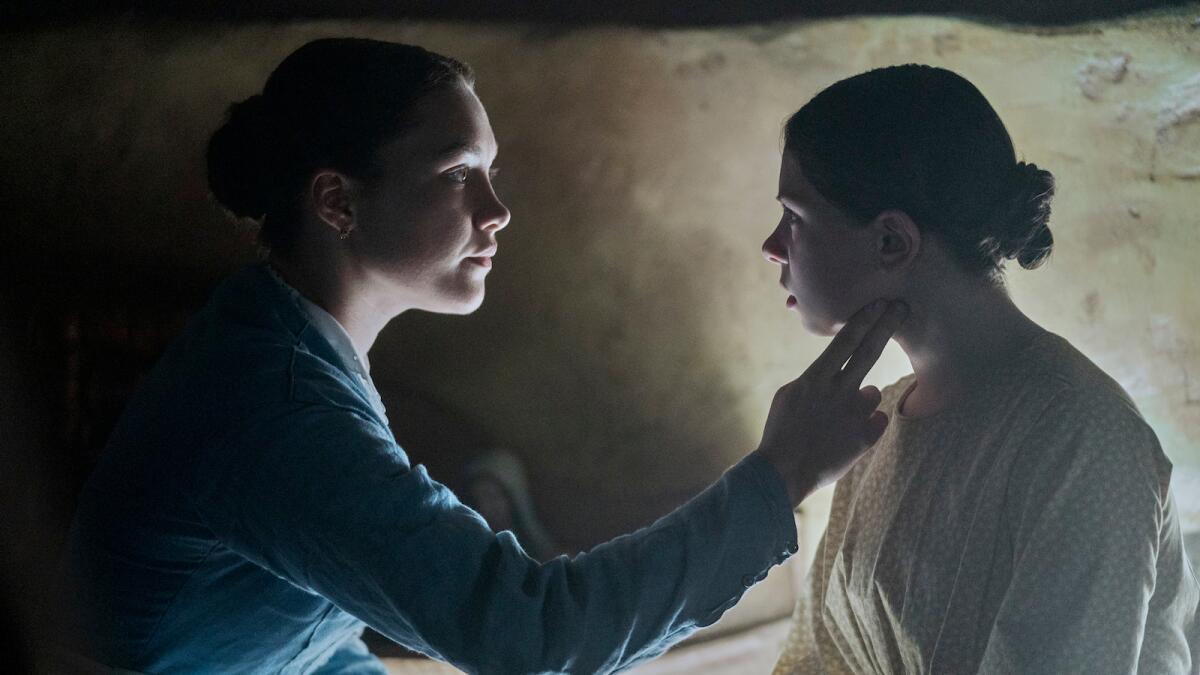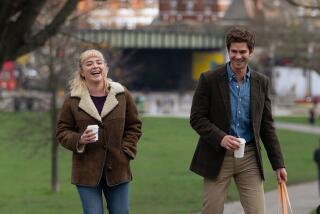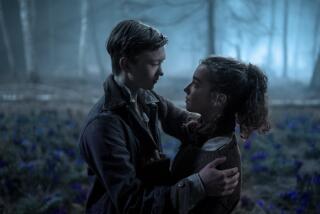Review: If ‚ÄėThe Wonder‚Äô doesn‚Äôt quite live up its title, it remains something to behold

Chilean director Sebasti√°n Lelio‚Äôs solidly engrossing new film, ‚ÄúThe Wonder,‚ÄĚ is set in post-famine 19th century Ireland, which aligns with the trappings of its source material ‚ÄĒ ‚ÄúRoom‚ÄĚ author Emma Donoghue‚Äôs 2016 novel. That sounds obvious, but when the movie opens, it‚Äôs not on a rain-swept countryside, but rather a brightly lighted modern soundstage with scaffolding around what looks to be a boxy house set, and a woman‚Äôs voice telling us that we‚Äôre about to watch a movie. She‚Äôs hopeful we‚Äôll give in to the illusion, because, she says, ‚Äúwe are nothing without stories.‚ÄĚ
Cinema is indeed both a challenge of belief and an opportunity to bind us to the grand narrative that is humankind. So each movie is possibly, yes, a wonder. But few draw attention to that, as if the imagined audience were culture-starved innocents or alien beings, not well-chilled Netflix subscribers.
For your safety
The Times is committed to reviewing theatrical film releases during the COVID-19 pandemic. Because moviegoing carries risks during this time, we remind readers to follow health and safety guidelines as outlined by the CDC and local health officials.
Sure, the beginning is arch, and it‚Äôs twee, but it‚Äôs not some mindless gimmick. What Lelio and Donoghue (as co-adapter with Alice Birch) clearly believe is that their Brechtian device ‚ÄĒ which gives way when the camera eventually pushes into the past through the period-dressed hold of a ship ‚ÄĒ is a potent way to connect us to English nurse Lib Wright (Florence Pugh), traveling to Ireland and considering her own peculiar invitation to the unreal: a healthy looking 11-year-old Irish girl who claims she hasn‚Äôt eaten a scrap of food in four months, just ‚Äúmanna from heaven.‚ÄĚ Lib has been hired by a committee of male elders to monitor Anna (K√≠la Lord Cassidy) for two weeks and offer her assessment of the girl‚Äôs veracity.
Trained on the Crimean War battlefields but not entirely powerless to her own vulnerabilities and needs, Lib views her unusual caretaking assignment ‚ÄĒ shared in shifts with a nun and unavoidably imposing on a pious, scrutinized family ‚ÄĒ as both an investigation (is she secretly eating?) and a campaign to break so severe a fast.
But the single-minded men, who include a doctor (Toby Jones), a priest (Ciar√°n Hinds) and a landowner (Brian F. O‚ÄôByrne), care about fact-finding less than they do proof of the miraculous in the wake of a historic famine. Hovering in the village as well is a nosy but appealingly rational big city journalist (Tom Burke), whom Lib must decide is either an ally or a hindrance in determining the authenticity of a ‚Äúmiracle girl,‚ÄĚ and perhaps something more.
As a mystery exploring the limits of faith and reason in a society‚Äôs more closed-off corners, anchored by a benevolent skeptic who‚Äôd rather help one child than expose a community‚Äôs fault lines of repression, ‚ÄúThe Wonder‚ÄĚ undeniably resonates in these confounding times concerning belief, fact and manipulation.
Anna‚Äôs lonely, culturally reinforced holiness ‚ÄĒ sincere but worrisome ‚ÄĒ and Lib‚Äôs engagement with it reminded me of a phrase that journalist Rachel Aviv coined for her powerful recent book (‚ÄúStrangers to Ourselves‚ÄĚ) about mental health and self-narratives: what she calls the ‚Äúpsychic hinterlands.‚ÄĚ It also aptly describes Ari Wegner‚Äôs moody, tactile cinematography, in which a dank house alone on a harsh plain is like a mind on the outer edges of experience, while bursts of color ‚ÄĒ damp greens, purple heather, a fire‚Äôs glow ‚ÄĒ become respites from the gloom.
And yet ‚ÄúThe Wonder‚ÄĚ can be bumpy, too often seeming to be about itself, not letting us inside it. Primed for theatricality by that opening, we get something very much staged instead of probed, pointed at rather than expressed. Apart from Pugh‚Äôs sturdy, intelligent portrayal of truth-seeking as a minefield, and Cassidy‚Äôs commandingly enigmatic, whispery pall, Lelio ‚ÄĒ known for his generous focus on a single main character (‚ÄúA Fantastic Woman,‚ÄĚ ‚ÄúGloria‚ÄĚ) ‚ÄĒ seems disinterested in the other actors‚Äô roles as living, breathing parts of a community that helped create, is still shaping and might decide, a girl‚Äôs fate.
Lib, of course, has a different notion about Anna‚Äôs destiny, which is what triggers the nervous tension in the movie‚Äôs well-handled resolution of its gothic suspense and theme of moral responsibility. ‚ÄúThe Wonder‚ÄĚ may not ultimately describe itself, but in its admiration for the mysteries of storytelling and self-preservation ‚ÄĒ articulated at first, but shown in the contours of its ending ‚ÄĒ there is something worthwhile to behold.
‚ÄėThe Wonder‚Äô
Rated: R, for some sexuality
Running time: 1 hour, 48 minutes
Playing: Starts Nov. 2, Los Feliz Theater; Landmark Westwood; Bay Theatre, Pacific Palisades; also available on Netflix
More to Read
Only good movies
Get the Indie Focus newsletter, Mark Olsen's weekly guide to the world of cinema.
You may occasionally receive promotional content from the Los Angeles Times.










